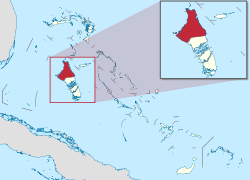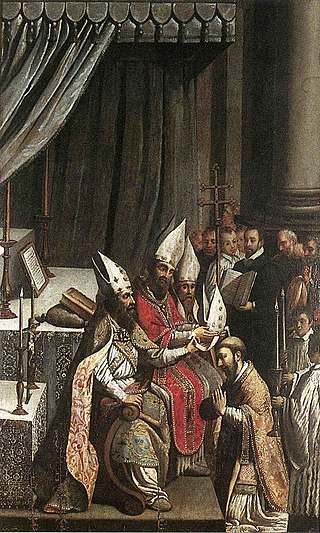
Apostolic succession is the method whereby the ministry of the Christian Church is considered by some Christian denominations to be derived from the apostles by a continuous succession, which has usually been associated with a claim that the succession is through a series of bishops. Those of the Catholic, Eastern Orthodox, Scandinavian Lutheran, Anglican, Oriental Orthodox, Church of the East, Hussite, Moravian, and Old Catholic traditions maintain that "a bishop cannot have regular or valid orders unless he has been consecrated in this apostolic succession". These traditions do not always consider the episcopal consecrations of all of the other traditions as valid.

An episcopal polity is a hierarchical form of church governance in which the chief local authorities are called bishops. The word "bishop" here is derived via the British Latin and Vulgar Latin term *ebiscopus/*biscopus, from the Ancient Greek ἐπίσκοπος epískopos meaning "overseer". It is the structure used by many of the major Christian Churches and denominations, such as the Catholic, Eastern Orthodox, Oriental Orthodox, Church of the East, Anabaptist, Lutheran, and Anglican churches or denominations, and other churches founded independently from these lineages. Many Methodist denominations have a form of episcopal polity known as connexionalism.
Methodism, also called the Methodist movement, is a Protestant Christian tradition whose origins, doctrine and practice derive from the life and teachings of John Wesley. George Whitefield and John's brother Charles Wesley were also significant early leaders in the movement. They were named Methodists for "the methodical way in which they carried out their Christian faith". Methodism originated as a revival movement within Anglicanism with roots in the Church of England in the 18th century and became a separate denomination after Wesley's death. The movement spread throughout the British Empire, the United States and beyond because of vigorous missionary work, and today has about 80 million adherents worldwide.
Full communion is a communion or relationship of full agreement among different Christian denominations or Christian individuals that share certain essential principles of Christian theology. Views vary among denominations on exactly what constitutes full communion, but typically when two or more denominations are in full communion it enables services and celebrations, such as the Eucharist, to be shared among congregants or clergy of any of them with the full approval of each.

Charles Wesley was an English Anglican cleric and a principal leader of the Methodist movement. Wesley was a prolific hymnwriter who wrote over 6,500 hymns during his lifetime. His works include "And Can It Be", "O for a Thousand Tongues to Sing", "Christ the Lord Is Risen Today", "Love Divine, All Loves Excelling", the carol "Hark! The Herald Angels Sing", and "Lo! He Comes With Clouds Descending".
The Methodist Episcopal Church (MEC) was the oldest and largest Methodist denomination in the United States from its founding in 1784 until 1939. It was also the first religious denomination in the US to organize itself nationally. In 1939, the MEC reunited with two breakaway Methodist denominations to form the Methodist Church. In 1968, the Methodist Church merged with the Evangelical United Brethren Church to form the United Methodist Church.
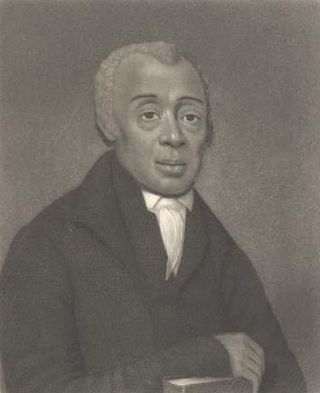
Richard Allen was a minister, educator, writer, and one of the United States' most active and influential black leaders. In 1794, he founded the African Methodist Episcopal Church (AME), the first independent Black denomination in the United States. He opened his first AME church in 1794 in Philadelphia.
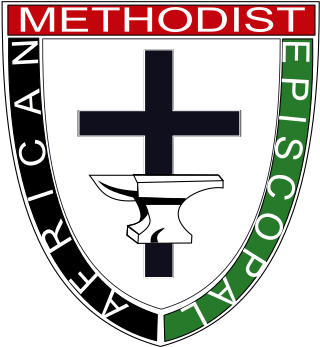
The African Methodist Episcopal Church, usually called the AME Church or AME, is a Methodist denomination based in the United States. It adheres to Wesleyan–Arminian theology and has a connexional polity. It cooperates with other Methodist bodies through the World Methodist Council and Wesleyan Holiness Connection.
The Confessing Movement is a largely lay-led theologically conservative Christian movement that opposes the influence of theological liberalism and theological progressivism currently within several mainline Protestant denominations and seeks to return those denominations to its view of orthodox doctrine or to form new denominations and disfellowship (excommunicate) them if the situation becomes untenable. Those who eventually deem dealing with theological liberalism and theological progressivism within their churches and denominations as not being tenable anymore would later join or start Confessional Churches and/or Evangelical Churches that continue with the traditions of their respective denominations and maintaining orthodox doctrine while being ecclesiastically separate from the Mainline Protestant denominations.

Andros Island is an archipelago within The Bahamas, the largest of the Bahamian Islands. Politically considered a single island, Andros in total has an area greater than all the other 700 Bahamian islands combined. The land area of Andros consists of hundreds of small islets and cays connected by mangrove estuaries and tidal swamplands, together with three major islands: North Andros, Mangrove Cay, and South Andros. The three main islands are separated by bights, estuaries that trifurcate the island from east to west. It is 167 kilometres (104 mi) long by 64 km (40 mi) wide at the widest point.

Local government in the Bahamas exists at two levels: 32 districts and 41 towns. The boundaries of districts are defined by the First Schedule of The Bahamas Local Government Act 1996, defined with reference to parliamentary constituency boundaries. The Second Schedule lists 13 districts which are divided into town areas. Towns are governed by directly elected town committees. Second Schedule districts are governed by nine-person district councils composed of the chairs of the town committees, and if numerically required, additional people elected by the town committees. The 19 Third Schedule districts are unitary authorities which cannot be divided into towns. They are governed by nine-person district councils which are directly elected by voters. The powers of Second Schedule and Third Schedule councils are slightly different, and the Third Schedule district known as the City of Freeport has a slightly different list of enumerated powers.

South Andros is a district of the nation of the Bahamas.
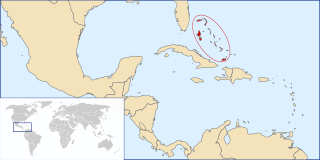
The following is an alphabetical list of topics related to the Commonwealth of The Bahamas.
The ordination of women has been commonly practiced in Methodist denominations since the 20th century, and some denominations earlier allowed women to preach.

Stafford Creek is a town on North Andros Island in the Bahamas. It is about 3 miles (4.8 km) north of Staniard Creek and about 40 miles (64 km) west of Nassau and about 160 miles (260 km) southeast of Miami. In 2010, the town had a population of 98.

The history of Methodism in the United States dates back to the mid-18th century with the ministries of early Methodist preachers such as Laurence Coughlan and Robert Strawbridge. Following the American Revolution most of the Anglican clergy who had been in America came back to England. John Wesley, the founder of Methodism, sent Thomas Coke to America where he and Francis Asbury founded the Methodist Episcopal Church, which was to later establish itself as the largest denomination in America during the 19th century.

The Bible Methodist Connection of Churches is a Methodist denomination within the conservative holiness movement. The connection is divided into four regional conferences: the Southern Conference, led by Rev. John Parker; the Southwest Conference, led by Rev. G. Clair Sams; the Heartland Conference, led by Rev. Chris Cravens; and the Great Lakes Conference, led by Rev. David Ward.
